Insulate Your Home for Free: Exploring GBIS and ECO4 Grants for External Wall Insulation

- Insulate Your Home for Free
- Check Your Eligibility for Free External Wall Insulation
- What is External Wall Insulation?
- Why Consider External Wall Insulation?
- Government Grants for External Wall Insulation
- Great British Insulation Scheme (GBIS)
- Energy Company Obligation (ECO4)
- Eligibility Criteria
- How to Apply for Free External Wall Insulation
Uninsulated walls significantly contribute to the UK's energy crisis. Without proper wall insulation, about a third of your home’s heat can escape, leading to substantial energy waste. Shockingly, around 90% of solid wall properties in the UK either lack insulation or are poorly insulated. This is one of the main causes of the high level of carbon emissions in the UK.
Properly insulating your walls can significantly cut down on energy bills and support a greener future by reducing your carbon footprint. Recognizing this benefit, the UK government has introduced grants to motivate homeowners to insulate their properties. These grants are part of the UK's larger plan to reach net-zero carbon emissions by 2050, providing financial assistance to make homes more energy-efficient and environmentally friendly. By utilising these grants, you not only save money but also contribute to the nation's environmental goals.
In this article, we will explain how external wall insulation works and its benefits. We will then introduce you to the government grants and schemes available for free external wall insulation.
Check Your Eligibility for Free External Wall Insulation
Want to go straight to the eligibility check? Fill out this form to check your eligibility for free external wall insulation and take the first step towards a more energy-efficient home.
What is External Wall Insulation?
External wall insulation is a powerful way to improve your home's energy efficiency, especially for houses with solid walls. This method involves adding an insulating layer to the exterior of your home, which is then covered with a protective render or cladding. This process not only reduces heat loss but also enhances your home's appearance and durability.
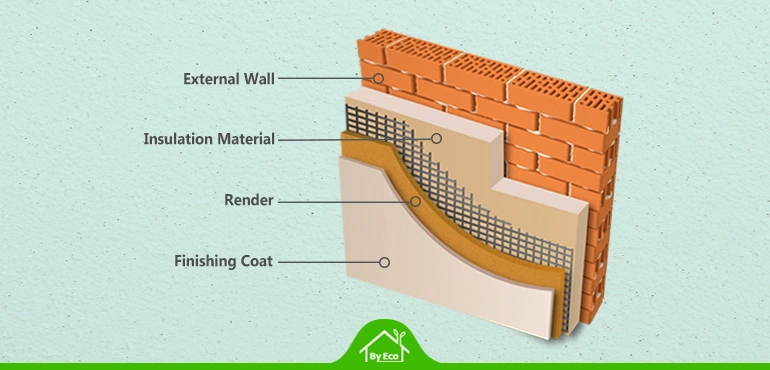
- Preparation: The external walls are prepared by cleaning and repairing any damage.
- Insulation Layer: A layer of insulation insulation material, such as expanded polystyrene (EPS) or mineral wool, is fixed to the exterior walls. For more information, check out our article on External Wall Insulation Materials.
- Protective Layer: The insulation is covered with a protective render or cladding, which can be customised to match your home’s aesthetics.
Why Consider External Wall Insulation?
With the UK's ongoing energy crisis and the rising cost of utilities, many homeowners are looking for effective ways to improve their home's energy efficiency. External wall insulation is one of the most impactful solutions available, offering a range of benefits that go beyond just energy savings.
Energy Savings
External Wall Insulation helps keep your home warmer in the winter and cooler in the summer, leading to substantial reductions in heating and cooling costs.
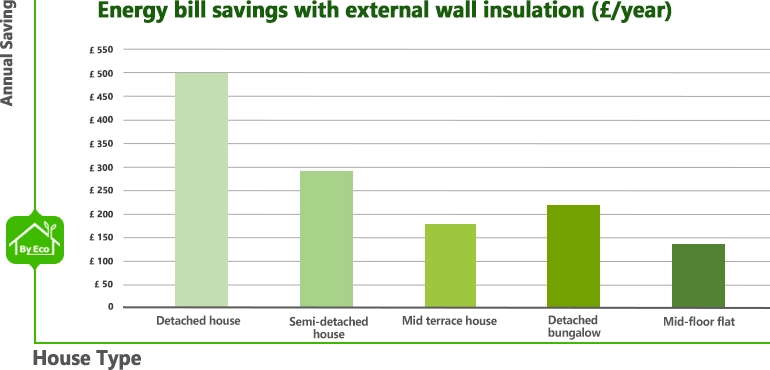
According to the Energy Saving Trust, insulating the exterior walls of a detached house can save around £550 per year, while a semi-detached house can save approximately £300 annually. These savings are due to the substantial reduction in heat loss, which can be as much as 25% to 45% through uninsulated walls.
Enhanced Comfort
By reducing drafts and maintaining a more consistent indoor temperature, external wall insulation makes your home more comfortable year-round.
Improved Health
External wall insulation prevents dampness and condensation issues, which can degrade interior finishes and contribute to respiratory problems. By keeping walls warmer, external wall insulation reduces the likelihood of mould growth and condensation, creating a healthier indoor environment. This improvement in comfort, coupled with the energy savings and reduced carbon footprint, makes external wall insulation a valuable upgrade for many UK homeowners.
Improved Aesthetics
External wall insulation can give your home a fresh new look, as the outer layer can be finished in a variety of textures and colours to enhance your property’s appearance.
Environmental Impact
Insulating your walls reduces your home's carbon footprint, contributing to the UK’s goal of achieving net-zero carbon emissions by 2050.
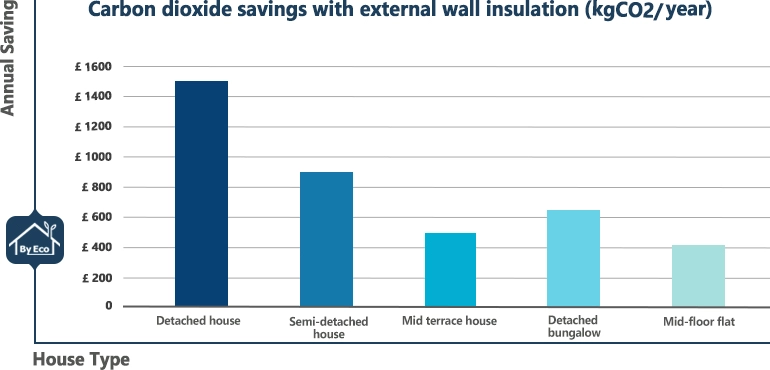
By installing external wall insulation, you contribute significantly to a reduction in carbon emissions. For instance, based on data from the Energy Saving Trust, a detached property can reduce its CO2 emissions by up to 1,500 kilograms annually.
Higher property value
Proper external wall insulation results in a higher Energy Performance Certificate (EPC) rating. A higher EPC means a higher appeal to buyers and renters and increased property value.
By considering external wall insulation, you not only improve your home's energy efficiency but also enhance its comfort, aesthetics, and overall value. Start your journey towards a more sustainable and cost-effective home today!
Government Grants for External Wall Insulation
Currently, there are two main government grants for external wall insulation: the Energy Company Obligation (ECO4) and the Great British Insulation Scheme (GBIS). Both provide partial or full funding for various types of insulation, including external wall insulation.
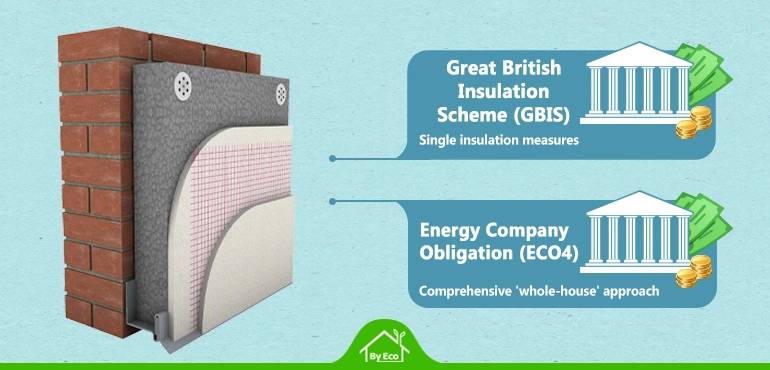
Great British Insulation Scheme (GBIS)
The GBIS, formerly known as ECO+, offers financial assistance to low-income, fuel-poor, and energy-inefficient homes. This scheme focuses on providing single insulation measures, including external wall insulation, to qualifying households. However, it primarily covers the insulation itself and not necessarily the cladding that might be used to cover the insulation layer.
Energy Company Obligation (ECO4)
The ECO4 scheme takes a more comprehensive "whole-house" approach, providing various energy-efficient measures, including external wall insulation. This scheme is targeted at vulnerable households and aims to significantly improve the energy performance of homes. Like GBIS, ECO4 covers the insulation material and its installation but does not specifically mention grants for cladding used as a decorative or protective layer over the insulation
Eligibility Criteria
Generally, the eligibility criteria for both GBIS and ECO4 are the same and are designed to assist low-income and vulnerable households in improving their home's energy efficiency. These schemes aim to reduce energy bills and contribute to the UK's carbon reduction goals by providing insulation and other energy-saving measures.
General Eligibility Criteria
-
Income Threshold:
- Households with a combined annual income of £31,000 or below are eligible for both ECO4 and GBIS. This includes income from wages, pensions, and any benefits received.
-
Benefit Recipients:
-
Households receiving the following benefits qualify
for both schemes:
- Income-based Jobseeker’s Allowance (JSA)
- Income-related Employment and Support Allowance (ESA)
- Income Support
- Pension Credit (Guarantee Credit or Savings Credit)
- Working Tax Credit
- Child Tax Credit
- Universal Credit
- Housing Benefit
-
Households receiving the following benefits qualify
for both schemes:
-
Energy Performance Certificate (EPC) Rating:
- Properties must have an EPC rating of D, E, F, or G. Priority is given to homes with the lowest ratings (E, F, or G).
-
Property Ownership:
- The schemes are available to both homeowners and private renters, though private renters will need landlord permission. Social housing tenants can also be eligible under specific conditions.
Specific Criteria for ECO4
-
Whole-House Approach:
- ECO4 focuses on a comprehensive "whole-house" approach, providing multiple energy efficiency measures tailored to the home’s needs.
-
Health and Vulnerability:
- Households with individuals who have health conditions exacerbated by cold weather are given priority.
-
Local Authority Flexibility (LA Flex):
- Local authorities can set additional criteria to assist households in need, allowing for broader income ranges and specific local needs.
Specific Criteria for GBIS
-
Single Measure Focus:
- GBIS typically provides a single insulation measure per qualifying household, such as cavity wall insulation, loft insulation, or external wall insulation.
-
Eligibility for Low-Income and Vulnerable
Groups:
- GBIS targets low-income and vulnerable households, supporting those in fuel poverty and homes with an EPC rating of D to G.
How to Apply for Free External Wall Insulation
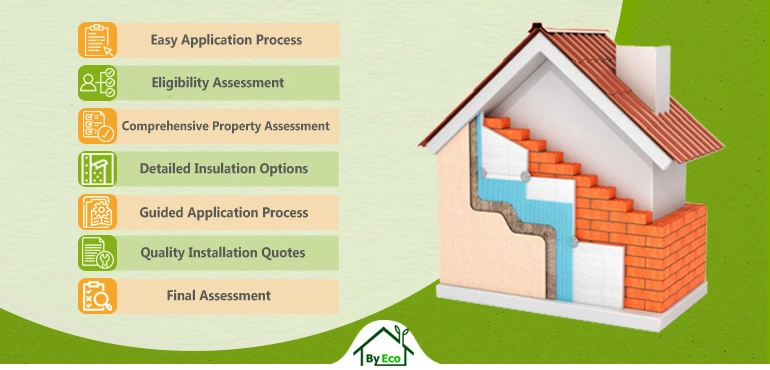
Easy Application Process: To apply for free external wall insulation, simply fill out our form or contact us directly. ByEco will handle everything else, ensuring a hassle-free experience.
Eligibility Assessment: Our team of experts will assess your eligibility for both the Great British Insulation Scheme (GBIS) and the Energy Company Obligation (ECO4), selecting the best option for your home.
Comprehensive Property Assessment: We will conduct a thorough assessment of your property to determine if external wall insulation is the most effective solution for you.
Detailed Insulation Options: You will receive a detailed list of all the free insulation options available for your property.
Guided Application Process: We guide you through the entire application process, ensuring it is smooth and straightforward.
Quality Installation Quotes: To ensure the best results, we provide quotes from top-rated installers in your area, ensuring you get the best deal and optimal installation.
Final Assessment: Once the installation is complete, our insulation experts will perform a final assessment to ensure the insulation has been properly installed and your home’s energy efficiency has been maximised.
Applying for these grants can significantly reduce your energy bills and improve your home’s comfort and value. Take advantage of this opportunity to enhance your home's energy efficiency and contribute to a greener future.
